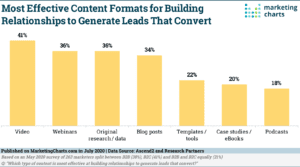When was the last time you read or watched a full post scrolling on Instagram or Facebook?
Thanks to data, marketers know the average person on social media spends around eight seconds before losing attention – Vine had the right idea (RIP). This is why it’s so important to focus on implementing engaging content that continues to speak to your audience effectively without losing their attention. Implementing microcontent into your overall plan can prove to be strategic and provides more engagement opportunities, especially on social media.
What is microcontent?
Microcontent is short form media that is designed around the platform it’s viewed on and aims to connect with a relevant audience by communicating the theme and message of the original long-form content. Although the definition of microcontent has evolved, there are four main variables to consider. Easy to digest, context, relevance, and time. You can think of microcontent as a collection of short pieces of information that relate to your audience without taking too much time.

You’re exposed to microcontent more than you think. A short preview loop of a Netflix show, an answer from Google search, or maybe an Instagram post that stopped your from scrolling. Powered by social media, microcontent is a powerful tool to grab your audience’s attention and direct them to your offering.
How to start creating microcontent
You can create microcontent from your existing stash. If you have a blog post, select a short sentence to post on Twitter. You can use the same piece of content with an added visual element to post on Instagram. If you have a podcast, you can turn your audio into audiograms to post on socials or run ads. A Livestream can be repurposed with snippets posted on Facebook. These are all examples of using available content, but if you’re planning to create content from scratch, you can go even further to prep.
Important concepts for planning microcontent
Respect the audience, respect the platform
Knowing the state of mind your audience is in on each platform is often overlooked when creating content in general. Microcontent thrives on social media and your content should be made specifically for each platform. The psychology of each individual on different social platforms varies. The same person on Facebook has different intentions when on LinkedIn or Pinterest. Keeping your microcontent relevant to each platform brings more value to your audience at the right time.
Find opportunities in your content creation process
Audit your content process. If you Livestream, plan ahead and make an effort to share a segment that still conveys the context of your Livestream as a stand-alone piece. This applies to videos as well. If you’re planning to interview multiple people as part of a project, ask questions that you can use as stand-alone pieces on your socials – microcontent.
Short, sweet, and simple
Simple is hard. Remember that the “micro” in your content is relative to your overall content strategy, but it is imperative to keep it quick and easy to digest. Microcontent should almost always be an ultra-short by-product of its associated macro-content. When planning, remember that video is still king because it gives your audience a better recollection of your business. However, content is subjective and you should focus on content that resonates with your audience.

You can incorporate and encourage user generated content as part of your microcontent strategy as well. This keeps your microcontent themes easy to create and can even inspire more ways to connect to your audience. Remember that the ultimate goal is to create an impression through all the social noise online and to build trust with your audience.
Cover Photo by Nick Wehrli from Pexels.
Recent Posts
Navigating the Digital Buying Cycle: Strategies for Modern Consumers
In today’s fast-paced world, where information is just a tap away, the buying cycle has transformed dramatically. Gone are the days when consumers...
Digital Marketing Strategies in the Off-Season
Ah, the off-season. For some businesses, it’s a time to kick back, relax, and sip on a well-deserved latte. For others, it’s a...
How ChatGPT is Transforming Online Search Behaviour
In the ever-evolving landscape of digital information, the way we search for answers is undergoing a seismic shift. We got used to searching...



